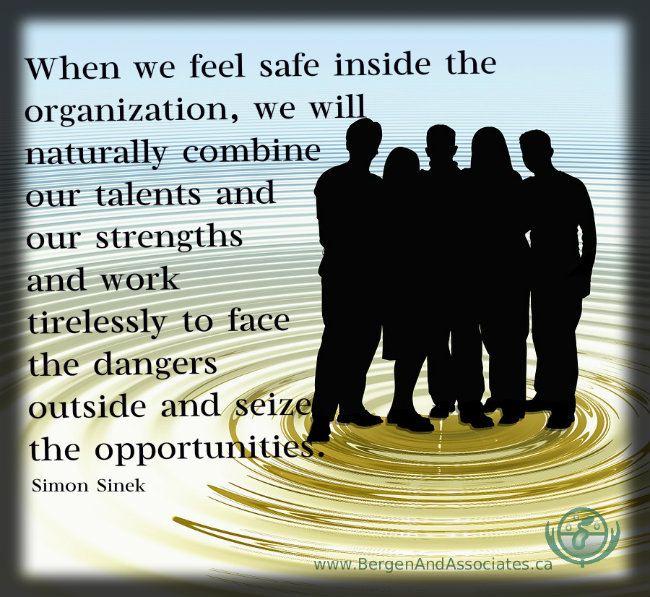
Work? Do you like it?
According to American research (and I’m not sure Canada would be far different on this one), only 30% of employees find themselves engaged at work.
Yikes!
“For most of us…work is a depleting, dispiriting experience.”
Two ways in which I connect with this:
1. I remember graduating from university, having been properly trained in how to answer interview questions a prospective employer may ask. I was also trained in how to ask proper questions of the potential employer about opportunities for further training, professional development, advancement opportunities and what committees I could volunteer on–all to use my questions as further evidence to impress the interviewer that I would be perfect for the job.
What I really wanted to ask was:
- Do people like working here?
- Do they like each other?
- Do you go for lunch together and laugh and have fun?
- Do you have a TV show that everyone watches and then dissects the next morning at coffee break in a way that celebrates being together and having a “thing”?
- Do people support each other?
- When a person makes a mistake, how to others handle it?
- Do people go the extra mile sometimes for others just because?
- Do people go home at the end of the day feeling like they worked hard with friends and it was a rich and life giving experience?”
I wanted to ask that…but I didn’t.
-There is sudden understanding that having no washroom plan for staff is a problem for all in a mobile truck service…but creates a particular challenge for the female staff. After several hours in the hot factory, the horror of axing Gatorade in the fridge in the latest round of budget cuts is felt. He suddenly gets how skimping with factory workers has an element of cruelty to it.
-A CEO recognizes that when you don’t supply the proper tools to employees, they use their own manual screwdrivers and such to take apart furniture prior to moving. The CEO quickly decides each location is supplied with power tools that can dismantle furniture in a fraction of the time improving efficiency and decreasing frustration of employees.
-A company that felt compelled to impose wage freezes has an executive spend a day with someone actually living with the impact of that wage freeze. Real people with real children living on the edge are impacted in significant ways–impacting the ability to pay rent, buy medications etc. The wage freeze that seemed so necessary suddenly and compellingly becomes possible for the boss to lift.
Undercover Boss challenges those at the top to reconnect and re-engage with front line staff in a way that has them understand how they didn’t really understand…and I would suspect that watching them “get it” and be impacted by it is what makes this show so popular across the continent.
We love to see the position of “the little guy” finally be understood by the folks at the top…and the re-engagement by employees at the end of the show is a tear jerker. (OK, I’m a softie…works for me every time, anyways).
A recent article by the Sunday Review seeks to help us understand, “Why you hate work.” What a grew article…Rising demands, increased dependence on technology, the constant barrage of info that employees are expected to deal with all hours of the day, and the creation of culture that dehumanizes employees all contribute to the problem.
Employees disengage when they are treated as cogs in a money making machine rather than people. Workers silently withdraw when their work is shown value with authentic gratitude…when their intelligence and knowledge and creativity isn’t valued. When they feel dismissed and minimized. And don’t even get me started on the effect of shaming/blaming/bullying in the workplace…that’s toxic stuff. Even if directed at someone else and you’re a mere bystander…it erodes a person’s soul to witness and experience that. Being compared to others, given feedback in an unconstructive way that has a person feeling blamed and cornered, having your character (rather than behaviours) challenged sucks well being right out the workplace.
According to the “Why you hate work” article, four areas of employee wellness can increase engagement:
1. Physical Needs: Employees need opportunity to renew and recharge at work.
Is is possible to change position? Have meetings while going for a walk? During repetitive and mundane tasks, can the staff change it up some?
2. Emotional Needs: Employees benefit from feeling valued. They want to know their contributions are appreciated.
We all want to know we are appreciated. Everyone wants to be valued. One episode of Undercover Boss…one of the most important features of the job for one employee was an annual company picnic hosted by the company for all the employees…that day was significant to that employee as an occasion where he was honoured. Do bosses thank their employees? Do bosses notice and compliment good customer service, a job well done, an employee staying past quitting time until the task was completed–is that valued and honoured or taken for granted?
3. Mental Needs: When an employee can focus in an absorbed way on their most important tasks and define when and where they get their work done–well, they do better.
Melanie Thiessen, our office manager, told me about “the line” in her head around her job. She likes to be ahead of “the line” or even right on it. During the time of year when she is compiling things for taxes, or a special project puts her behind, or the phones are especially busy not letting her get to month end, she and I will have a conversation about where she is compared to “her line”. She is clear that she doesn’t enjoy her job in the same way when she is behind her line because of the stress of feeling like she isn’t keeping up (who likes that feeling)…and she helps me to help her stay at or ahead of the line. When Melanie is enjoying her job…the whole thing just works better and is more fun for all of us!
Me? Once or twice a week, I leave the office at 2 or 3, or don’t come in until 10…and sit in Starbucks…getting oodles of work done. With a latte, and the quiet, friendly buzz of people in the background (but no phones or co-workers to distract)..I. get. so. much. done.
4. Spiritual Needs: Employees do better when they get to do what they do best and enjoy most. Employees value being connected to a higher purpose at work.
How can employees find meaning if all they are doing is working on a widget in an isolated way from the rest of the business. If the dishwashers understand that their work is as vital and integral to success as the head chef (and isn’t it?–you can’t serve fine food on dirty plates), doesn’t that change things?

Engagement — variously defined as “involvement, commitment, passion, enthusiasm, focused effort and energy” — has now been widely correlated with higher corporate performance. In a 2012 meta-analysis of 263 research studies across 192 companies, Gallup found that companies in the top quartile for engaged employees, compared with the bottom quartile, had 22 percent higher profitability, 10 percent higher customer ratings, 28 percent less theft and 48 percent fewer safety incidents.
Simon Sinek has a fabulous new TED talk out talking about just this…imploring leaders to engage in a costly way with the employees. He even wrote a book entitled, “Leaders eat last”–he asks leaders of employees to recognize that when an environment of safety is created, employees can let go of the need to fight for their own survival and engage with others to create a successful community in the company. The leader leads by example that he would be willing to sacrifice himself for others…when you know the leader has your back…well, you start to return the favour.







Write a Comment